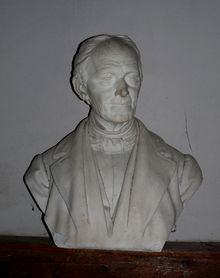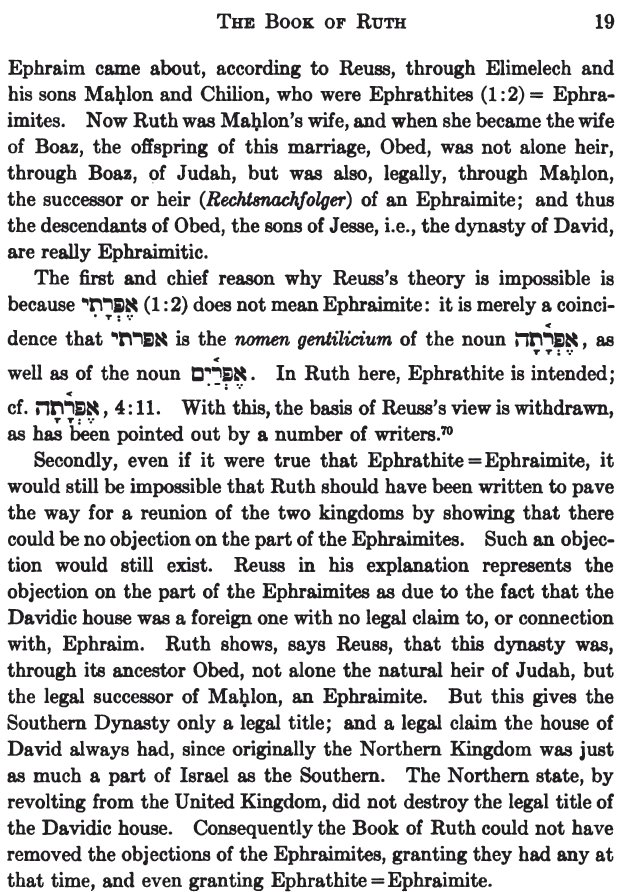APPENDIX VIII
Reuss on the Book of Ruth
 The author of this text came upon the concept and idea of there being but
one Messiah and that Messiah ben David and Messiah ben Joseph were therefore
but one and the same Messiah honestly. That is 'honestly' in that it was not
a borrowed or learned concept from any other source other than the original
texts of the scriptures and then on to other supporting evidences and texts.
In researching evidences of support there have been found others who have
thus considered and even settled upon the same conclussions. One such notable
person who has once settled upon the truth that the Royal Dynasty of David,
the descendant of Obed, was really Ephraimititc is Professor Edouard
Guillaume Eugene Reuss (1804-1891), a Protestant theologian from Alsace.
The author of this text came upon the concept and idea of there being but
one Messiah and that Messiah ben David and Messiah ben Joseph were therefore
but one and the same Messiah honestly. That is 'honestly' in that it was not
a borrowed or learned concept from any other source other than the original
texts of the scriptures and then on to other supporting evidences and texts.
In researching evidences of support there have been found others who have
thus considered and even settled upon the same conclussions. One such notable
person who has once settled upon the truth that the Royal Dynasty of David,
the descendant of Obed, was really Ephraimititc is Professor Edouard
Guillaume Eugene Reuss (1804-1891), a Protestant theologian from Alsace.
Edouard Reuss was born July 18, 1804 at Strasbourg, where he first studied
philology (1819-22). He went on to study theology at Gottingen under Johann
Gottfried Eichhorn; and Oriental languages at Halle under Wilhelm Gesenius,
and afterwards at Paris under Silvestre de Sacy (1827-28). In 1828 he
became 'Privatdozent' at Strasbourg. From 1829 to 1834 he taught
Biblical criticism and Oriental languages at the Strasbourg Theological
School; he then became assistant professor, and in 1836, a regular full
professor of theology at that university. He became Professor of Old Testament
at that same institution in 1864. Reuss sympathies were German and after the
annexation of Alsace to Germany he remained at Strasbourg, retaining his
professorship until he retired in 1888. Reuss belonged to the liberals of the
Lutheran Church.
 Professor Reuss had 'incorrectly' concluded upon a theory concerning the writing
and purpose of the Book of Ruth which included his conclusion upon the genealogy
of the house of David. It is presented here as referenced in a Dissertation by
Louis Bernard Wolfenson, M.A. upon The Book of Ruth he submitted
to the Board of University Studies of the Johns Hopkins University for the
degree of Doctor of Philosophy, Baltimore, Maryland (Febuary, 1907) 1911.
Professor Reuss had 'incorrectly' concluded upon a theory concerning the writing
and purpose of the Book of Ruth which included his conclusion upon the genealogy
of the house of David. It is presented here as referenced in a Dissertation by
Louis Bernard Wolfenson, M.A. upon The Book of Ruth he submitted
to the Board of University Studies of the Johns Hopkins University for the
degree of Doctor of Philosophy, Baltimore, Maryland (Febuary, 1907) 1911.
While the text of Ruth may have been transcribed and/or edited variously
including by perhaps Ezekiel during his stent and scriptural collections
according to the commandment of his chapter 37 to keep the stick of Judah, it is
generally understood that the original writings of what composed the Book of
Ruth was to be attributed to Samuel the Prophet and was once a part of the book
of Judges. As a separated little book, Ruth stands as a 'Jewish' testament of the
bloodline ancestry of David from Judah and thus subsequently Jesus Christ.
Unforturenately it lacks the mutually complete attribution of the 'covenant heir
record' of the 'birthright' Patriarch Joseph being ancestor of David in that
Boaz was raising up seed to the dead (Ruth 4:10), that the first born son to be
that of Mahlon the Ephrathite/Ephraimite who was the lawful ancestor of Obed,
Jesse, David and Christ as well.
Ruth 4:11 bears a foregone witness by all the people that were in the gate of the
city, which the elders did recite:
"We are witnesses. The LORD make the woman [Ruth] that is come into
thine house like Rachel and like Leah, which two did build the house of Israel:
and do thou worthily in Ephratah, and be famous in Beth-lehem:"
~ Old Testament | Ruth 4:11
The text of Ruth continues on by 'only' giving the ancestry of Leah's son Judah
being that of Ruth's son Obed. This may be due to the fact that the record was
maintained by the Jews as the stick of Judah. And per that 'conclusion' as reached
in 1 Chronicles 5:1-2, that 'they' would just keep the genealogy as pertaining to
Judah 'though' the birthright 'of the covenant' of the firstborn son of Ruth did
in fact pertain unto Joseph (son of Rachel), via his sons, namely Ephraim. Mahlon
was an Ephraimite, whose son Obed was to be raised up so that Mahlon's name and
'heir inheritance of the covenant' would not be cut off in Israel.
Missing in today's text of Ruth, or the whole of the Jewish Old Testament, is any
mention of the ancestry of Elimelech and his sons Mahlon and Chilion. They were
Ephrathites, meaning Ephraimites as concluded by Reuss correctly! That was Reuss'
great finding, though he couched it in his theory on when the book of Ruth was
writen
long after Samuel the Prophet. So couched it has almost slipped into cracks of
discovery. Knowing Samuel to be a Prophet of God, one must conclued that once
the book of Ruth had included both ancestries, the one of Leah from Judah and
the one from Rachel from Joseph and his son Ephraim. But again, as per the
conclusion arrived at in 1 Chronicals 5:1-2, which was likely compiled and written
during the Babylonian captivity or shortely thereafter, the Jewish 'scribes'
determined to only keep that genealogy after that of Judah even though the
'birthright' ancestry of King David was that of Joseph, son of Rachel.
 Now the Old Testament Biblical Professor Reuss had 'incorrectly' surmised that
the Book of Ruth had been written after the fall of Samaria or the scattering of
the Northern Kingdom of Israel for the purpose of a furtherance of a reunion
between the remnants of the Northern Kingdom, left behind in Ephraim, with the
Southern Kingdom of Judah. That may be a time of transcribling of records, but
Ruth was writen as part of the book of Judges by Samuel previously. The
reasoning he used was if the remnants of Israel could see in David's lineage that
they too were of Ephraim then there ought to be no objections to a reunion
of the two Kingdoms. Reuss has failed to accept that the Book of Ruth had
once not been a separate little book but a part of the history of the Judges
as a part of that Book of Judges when it was first compiled. And though Reuss
was correct in his conclusion that the house of David was of the lineage of
the covenant birthright of Ephraim, yet he saw not the real significance in
that. His critics quickly wrote his 'theory' off citing but the difference in
the names of Ephrathite and Ephraimite, which they were incorrect in doing. And
this even though the prophecy in Ezkiel 37 does, as to many other scriptures, but
also conclude upon the reuniting of Isreal, that is Joseph/Ephraim with Judah
under one Lord and King.
Now the Old Testament Biblical Professor Reuss had 'incorrectly' surmised that
the Book of Ruth had been written after the fall of Samaria or the scattering of
the Northern Kingdom of Israel for the purpose of a furtherance of a reunion
between the remnants of the Northern Kingdom, left behind in Ephraim, with the
Southern Kingdom of Judah. That may be a time of transcribling of records, but
Ruth was writen as part of the book of Judges by Samuel previously. The
reasoning he used was if the remnants of Israel could see in David's lineage that
they too were of Ephraim then there ought to be no objections to a reunion
of the two Kingdoms. Reuss has failed to accept that the Book of Ruth had
once not been a separate little book but a part of the history of the Judges
as a part of that Book of Judges when it was first compiled. And though Reuss
was correct in his conclusion that the house of David was of the lineage of
the covenant birthright of Ephraim, yet he saw not the real significance in
that. His critics quickly wrote his 'theory' off citing but the difference in
the names of Ephrathite and Ephraimite, which they were incorrect in doing. And
this even though the prophecy in Ezkiel 37 does, as to many other scriptures, but
also conclude upon the reuniting of Isreal, that is Joseph/Ephraim with Judah
under one Lord and King.
It seems somewhat quite ironic that Wolfenson's prime subjective argument
against Reuss' theory is so slim as a word difference which is still argued
today. Even the Book of Jasher (84:51) used the word 'Ephrathite' in
reference to Nun and his son Joshua being of the tribe of Ephraim and the
head of that tribe in position. Even other places in the Old Testament was it '
used to identify the Levite family of Samuel as living and thus belonging to
service to the tribe of Ephraim as 'Ephrathites'. And when a word
pronounciation could be used to distinguish who was of the tribe of Ephraim,
again the word used to itentify them as Ephraimite was 'Ephrathite'. Even
at the end of Wolfenson's second argument he steps back and states as much
as to say, 'even granting Ephrathite = Ephraimite, then his second argument
does defeat Reuss' theory as to when the Book of Ruth was written and for
what specific reason that Reuss had given.
Concerning the ancestry of Obed, Jesse and the house of David Reuss was
correct in his conclusion, David was the son of that Ephrathite, meaning
Ephraimite, Jesse. The Book of Ruth does put forth that genealogy when one
comes to know and understand all of the facts surrounding it. The Book of
Ruth just was not written when and for what specific purpose of that time
frame in which Reuss chose to place it. It is a case of 'a right conclusion'
for the wrong time and place reasons. It was not written after the return
of the Jews from Babylon for the purpose of uniting the remnant of Ephraim
with the kingdom of Judah at that time and place. It was of a much large
encompassing time and scope from the purposes of the beginning of the
foundation of the earth to the intended and purpose in the end thereof.